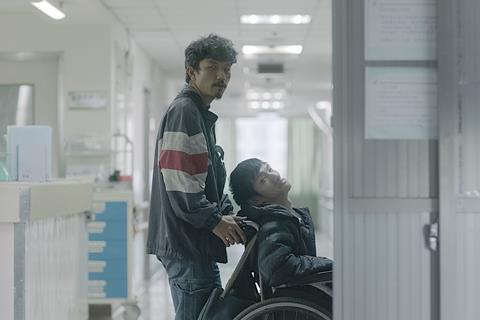An undocumented Thai man works as a caregiver in this sobering Directors Fortnight debut set in Taiwan

Dirs. Chiang Wei Liang & Yin You Qiao. Taiwan/Singapore/France. 2024. 128mins
Taiwan-based Singaporean filmmaker Chiang Wei Liang has devoted his career to the topic of the migration of Southeast Asian workers, with an emphasis on the challenges they face away from home due to their undocumented status. After receiving acclaim for his shorts Anchorage Prohibited (2015) and Nyi Ma Lay (2017), and VR short Only the Mountain Remains (2018), Chiang now makes his feature debut with Mongrel, co-directed with Yin You Qiao. Anchored by a lived-in performance from Wanlop Rungkumjad as a bedraggled migrant caregiver striving to maintain his humanity despite being exploited by his employer, this is a deeply sobering expansion of Chiang’s thematic focus.
Has an exacting rhythm that aligns with its unsparing presentation
Following its world premiere in Directors Fortnight, Mongrel should travel further. Its combination of tough subject matter and painstaking aesthetic means that this is the kind of film that needs to makes the most of its festival tour in getting its message across. Specialty distributors may detect modest art-house potential here, or feel that the film’s topicality could spark healthy discussion in the digital space.
In a remote mountain area of Taiwan, undocumented Thai migrant Oom (Rungkumjad) works as a caregiver to the elderly and disabled. Although he apparently lacks any formal qualifications, Oom has a careful and considerate manner which enables him to grow close to those he assists. They include Hui (Kuo Shu-wei), who has cerebral palsy, and his elderly mother Mei (Lu Yi-ching), who is contending with her own health issues. When she asks Oom to euthanise her son, the caregiver is profoundly conflicted about how to respond to her desperate request.
Further dilemmas are caused by Oom’s ties to his boss, Hsing (Hong Yu-hong), and relationships with fellow caregivers with whom he shares a basic dormitory. Oom is not only Hsing’s most reliable carer but also his right-hand man for less humane tasks involving local gangster Brother Te (Chen Wen-pin). As the caregivers haven’t been paid for several months, Oom is required to act as a reassuring intermediary. Yet his ability to placate their growing frustrations can only stretch so far.
Mongrel is shot in boxy academy ratio by cinematographer Michaël Capron which affords a sense of claustrophobia in a mountainous region. The initial use of cramped interiors (the home of Mei and Hui, Hsing’s van) and night-time exteriors (the migrant’s makeshift compound) obscures location to instead establish the entrapment that defines the lives of the workers (whose passports are in Hsing’s possession) and the locals they care for. We eventually get a medium wide landscape shot around 40 minutes in, but this does not prove to be a respite from studied grimness as the scene involves the crude disposal of a body. There is no rural idyll here. In many respects, Mongrel is as determinedly dark and dank as a social polemic set in an inner city.
Chiang is among the crop of promising young filmmakers mentored by Hou Hsiao-hsien (credited here as an executive producer) and his approach recalls the distanced yet empathic observational sensibility of the recently retired Taiwanese master. But in contrast to Hou’s meditative pacing, Mongrel has an exacting rhythm that aligns with its unsparing presentation. Dounia Sichov’s editing has a docudrama feel, particularly in the scenes that show Oom tending to Hui (affectingly played by Kuo, who lives with athetoid cerebral palsy).
Considerable time is spent showing Oom washing Hui, cooking his dinner and supervising a colleague during a physiotherapy session. Chiang’s screenplay stresses Oom’s patience and compassion by making the audience feel every second, while the film’s realist credentials are emphasised by forgoing score in favour of moody elemental sound design by RT Kao and Lim Ting Li.
Although the film illustrates how the hardships experienced by migrants (who have here relocated from the Philippines, Indonesia and Vietnam) are a side effect of systemic failures that open the door to opportunistic enterprises, this is primarily a character study. Going against the grain for human interest narratives, Oom’s motivations are hard to define. It would be a stretch to describe him as a complete saint, as he is complicit in Hsing’s schemes and less than transparent with sceptical caregivers when one of their members disappears shortly after falling ill.
Yet the quietly enigmatic Rungkumjad projects an air of decency which draws the audience into Oom’s compromised situation. The question of whether this ‘mongrel’ is staying in this hopeless place because he has no choice or actually deciding to remain adds a lingering layer of ambiguity to a powerful piece of social realism.
Production Companies: Deuxieme Ligne Films, E&W Films, Le Petit Jardin
International sales: Alpha Violet, info@alphaviolet.com
Producers: Lai Weijie, Lynn Chen, Chu Yun-ting
Screenplay: Chiang Wei Liang
Cinematography: Michaël Capron
Production design: Ye Tzu-wei
Editing: Dounia Sichov
Main cast: Wanlop Rungkumjad, Lu Yi-ching, Hong Yu-hong, Kuo Shu-wei, Atchara Sawan





















